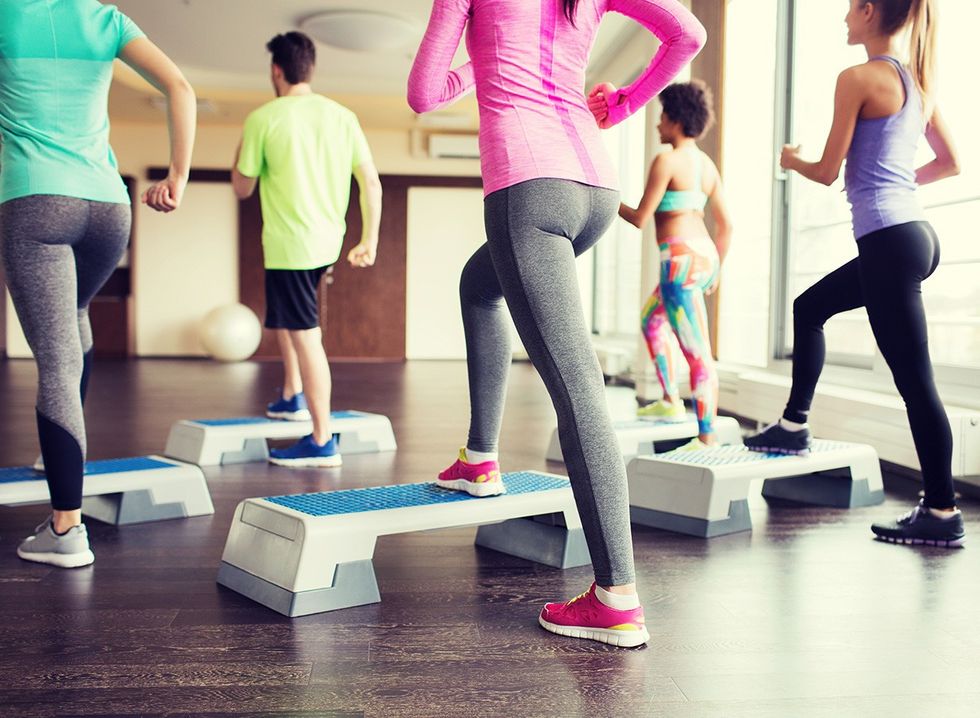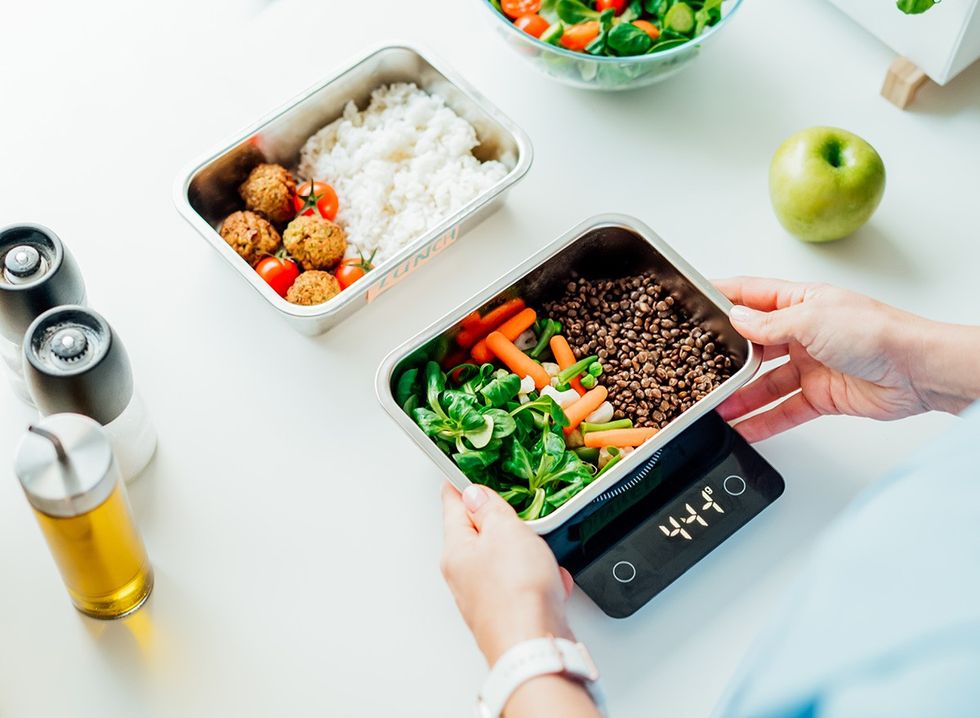If you’re on a successful health and fitness regimen—or even if you are just starting out on one—weekends can make or break your progress. It can be easy to slip into bad habits on the weekends, and undo all your good work during the week. By taking a few precautions and filling your weekend with fun, active, and helpful weight loss routines, there is no reason for your weight loss to slow down. Here are 15 weekend routines to keep you on the weight loss train.
Meal Prep

Meal prepping on the weekends helps ensure smart food choices during the week. "Many times unhealthy foods are chosen because of convenience," registered dietitian Silvia Veri tells Beaumont Health. "If we can take the time out to plan meals, write a grocery list and have fruits, vegetables, whole grains and beans available, they will become convenient and eaten more often."
Take a Stroll

Taking a nice walk when you have time is good for your physical and mental health, and helps burn fat. “A brisk 30-minute walk burns 200 calories,” says the Arthritis Foundation. “Over time, calories burned can lead to pounds dropped.”
Be Active With Friends

Being active with friends is not only fun, it helps you be accountable and more likely to stick to your workout. “When you and your buddy encourage each other, you’ll work harder (and get better results!), says the CDC. “And there’s nothing wrong with a little friendly competition.”
Stick To Sleep Routine

Don’t let the weekend derail your healthy sleep habits. Good sleep is important for weight loss. “Be consistent,” says the CDC. “Go to bed at the same time each night and get up at the same time each morning, including on the weekends.”
Healthy Breakfast

Enjoying a protein-packed breakfast will help you make better food decisions through the weekend. “Protein is a very satisfying nutrient,” Allegra Picano, RDN, tells Henry Ford Health. “Getting enough of it in your breakfast may help you eat more healthfully the rest of the day.”
Don’t Binge Drink

Binge drinking can undermine all your hard weight loss work, so be mindful of alcohol. “Drinking also adds calories that can contribute to weight gain,” says the Mayo Clinic. “And drinking raises the risk of problems in the digestive system.”
Hit the Gym

Studies show hitting the gym on the weekends offers significant benefits, so don’t be afraid to be a weekend warrior. “If you’re able to achieve those guideline-recommended levels over those one to two days of the week, then our findings show that you’re getting a similar benefit as people who are able to distribute it more evenly,” Dr. Shaan Khurshid, staff electrophysiologist at Massachusetts General Hospital and instructor of medicine at Harvard Medical School, tells CNN. “You shouldn’t be discouraged if you are one of those people where that kind of pattern works best for you.”
Meditate

Mediation is a great way to manage stress, which makes weight loss much easier. “Higher cortisol levels can also cause people to build up fat around their bellies,” says University of Utah Health. “Learning to reduce stress through exercise and meditation—while also being more mindful about food—can have a large impact on your well-being and help you keep weight off in the long-term.”
Work Out First Thing

Begin your day with a workout or a walk to start the day off on a positive note. “Morning workouts help reduce the possibility for obstacles to present themselves,” Jasmin Theard, ACSM HFS, tells Piedmont Health. “There is also less opportunity to make excuses.”
Get a Massage

Self-care is very important—get a massage to help you with recovery from your workouts during the week. “Massage therapy is safe and effective for people of all ages," Ivy Conrad, M.S.S.G.-L., tells the Mayo Clinic Health System. "It's not only a feel-good way to indulge or pamper yourself. It's a powerful tool to help you take charge of your health and well-being, whether you have a specific health condition or are looking for a stress reliever."
Relax!

Don’t forget to spend time resting and recovering if your weekday workouts are intense. “Experts recommend taking at least one day off from your daily workout routine each week,” says UCLA Health. “Taking a rest day after a particularly long or intense workout can be especially helpful.”
Visit Family and Friends

Spending time with friends and family is shown to be beneficial to health and wellness. “Stress can actually encourage inflammation in the arteries, which is a precursor to atherosclerosis, or clogged arteries,” according to Piedmont Health. “Having good friends and a strong social support network can relieve stress.”
Spend Time In Nature

Spending time in nature not only helps you burn fat, it’s good for your mental health. “Getting out into nature can lead us to want to walk, bike, hike, or kayak more often,” says UC Davis Health. “People typically engage in regular physical activity when they're in nature. So, stepping outside can help you keep a healthy weight or even lose weight by increasing activity levels.”
Drink Lots of Water

Don’t forget about your hydration goals during the weekend. "Getting enough water every day is important for your health," says the CDC. "Water has no calories, so it can also help with managing body weight and reducing calorie intake when substituted for drinks with calories, such as sweet tea or regular soda."
Cook For Yourself

Home cooking is known to have benefits for health and weight loss. “We already know that the more people cook at home, the healthier their diet, the fewer calories they consume, and the less likely they are to be obese or develop type 2 diabetes,” Monique Tello, MD, MPH, tells Harvard Health. “A growing body of scientific evidence supports teaching patients how to cook meals at home as an effective medical intervention for improving diet quality, weight loss, and diabetes prevention.”
💪🔥Body Booster: Support your weight loss efforts by sticking to healthy habits.








 Shutterstock
Shutterstock Shutterstock
Shutterstock Shutterstock
Shutterstock Shutterstock
Shutterstock Shutterstock
Shutterstock Shutterstock
Shutterstock






 Shutterstock
Shutterstock Shutterstock
Shutterstock Shutterstock
Shutterstock Shutterstock
Shutterstock Shutterstock
Shutterstock

 Shutterstock
Shutterstock Shutterstock
Shutterstock Shutterstock
Shutterstock Shutterstock
Shutterstock Shutterstock
Shutterstock Shutterstock
Shutterstock Shutterstock
Shutterstock Shutterstock
Shutterstock Shutterstock
Shutterstock Shutterstock
Shutterstock Shutterstock
Shutterstock Shutterstock
Shutterstock Shutterstock
Shutterstock Shutterstock
Shutterstock Shutterstock
Shutterstock Shutterstock
Shutterstock Shutterstock
Shutterstock Shutterstock
Shutterstock Shutterstock
Shutterstock

 I'm a Nutritionist and These 9 High-Protein Snacks Keep My Clients Full While Losing 50 Pounds
I'm a Nutritionist and These 9 High-Protein Snacks Keep My Clients Full While Losing 50 Pounds
 Shutterstock
Shutterstock 2. Processed FoodsShutterstock
2. Processed FoodsShutterstock Shutterstock
Shutterstock Shutterstock/Prostock-studio
Shutterstock/Prostock-studio Shutterstock
Shutterstock Pro TipsShutterstock
Pro TipsShutterstock Shutterstock
Shutterstock Shutterstock
Shutterstock Shutterstock
Shutterstock Shutterstock
Shutterstock Don’t Drink as Much AlcoholShutterstock
Don’t Drink as Much AlcoholShutterstock Most Women on GLP-1s Are Making a Few Common MistakesShutterstock
Most Women on GLP-1s Are Making a Few Common MistakesShutterstock Soda and Sugary DrinksShutterstock
Soda and Sugary DrinksShutterstock Shutterstock
Shutterstock Eat BreakfastShutterstock
Eat BreakfastShutterstock And Improve Insulin SensitivityShutterstock
And Improve Insulin SensitivityShutterstock Shutterstock
Shutterstock The Drugs Mimic the GLP-1 Hormone Naturally Produced by the BodyShutterstock
The Drugs Mimic the GLP-1 Hormone Naturally Produced by the BodyShutterstock 3. Deep-Fried ItemsShutterstock
3. Deep-Fried ItemsShutterstock